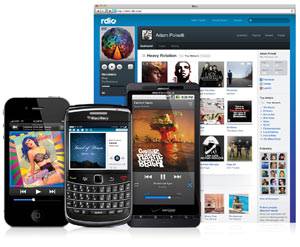Amazon has just launched a suite of music products that allow users to store their tracks online and them stream them over the Web or to any Android device courtesy of the Amazon MP3 mobile application. The launch has the tech world abuzz, not only because Amazon beat Apple and Google to the punch, both of whom are reportedly working on digital lockers of their own, but because Amazon hasn’t even received the record labels’ permission to host these tracks on its servers as of yet.

But is Amazon’s cloud-based music storage service really all that innovative? Some journalists and analysts are saying it’s not. Do you agree?
Smaller Startups Have Amazon Beat
To be impressed with Amazon’s offering, you have to ignore the numerous startups already serving this space. For example, Rdio, the on-demand music streaming service from Skype, Kazaa and Joost creators Niklas Zennstrom and Janus Friis, lets users store an unlimited amount of music from their own personal collections online. Rdio users download the Rdio Desktop software program, which scours for tracks saved to a computer’s hard drive. Those files are then matched with the tunes in Rdio’s own collection.

The price is a bit more than Amazon’s service, which starts by giving you 5 GBs for free. Instead, Rdio charges $4.99/month for Web access or $9.99/month for Web + mobile access. But the bonus here is that you also have access to Rdio’s entire collection of music totaling over 7 million songs. With Amazon, you can only access your own files or those you choose to purchase from Amazon’s MP3 store in the future.
If you aren’t interested in a subscription service and just want to store your own music “in the cloud,” smaller startups have already provided this capability for many months. In August 2010, for example, Audiogalaxy launched a mobile music streaming service which lets you stream music directly from your home computer to your mobile phone for free. Unlimited storage is provided here, too. After all – it is your own computer.
Another alternative service, Audiobox.fm, works on Android, iPhone/iPod Touch and the Web while storing files on its own servers. It’s $3.99/month for 11 GB. There’s also Grooveshark, Rhapsody, Napster, Soundcloud, Last.fm, Pandora, Songbird and others, all bringing music streaming to both online and mobile users.
5 GB for Free? Who Cares! We Have 100 GB of Music, Don’t You?
Then there’s this question: who does 5 GB even work for? Many digital music consumers have collections that span decades, including CDs imported into iTunes, MP3 files traded for free during the wild west days of Napster and torrenting plus carefully curated playlists of tracks purchased in later years from online stores like iTunes, Amazon and eMusic.
To get a better understanding of Amazon’s pricing, consider this: a 100 GB collection, stored in Amazon’s cloud, is $100.00 per year. 1,000 GB is $1,000 per year. These are not prices that make sense when you can get access to 7 million tracks at Rdio for $10 per month. Or 10 million tracks at MOG for the same rate.

Forrester: This isn’t Innovation
Even ignoring Amazon’s competition, Amazon’s service itself just isn’t all that innovative. Or so says Forrester analyst Mark Mulligan. “…Let’s not get carried away,” he wrote in a blog post today. “As logical a next step in the digital music market that locker services might be, theyre not an innovation in the music product. Theyre simply giving people access to the music they have on the devices they own. Consumers simply expect this.”
Darned right we do. For the prices Amazon charges, we should expect access to subscription music, not just paid access to our own files. And we expect to be able to stream that music to all our devices. Amazon isn’t even providing that – it’s limited to the Web and Android phones. What about our TVs, cars, home stereos? What about our iPhones? Streaming music services like Pandora, Rdio, MOG and others are integrating themselves into all sorts of appliances and consumer electronics products. You can stream Pandora from a Samsung Refrigerator. Rdio from your Sonos system. MOG from your car. Where can you stream Amazon? Selectmobile phones? The Web? How earth-shaking.
In fact, “Amazon’s Cloud Music Move Isn’t Earth-Shaking” is the exact headline Peter Kafka used to describe the launch over on AllThingsD.
“The future of cloud-based music is here today,” he wrote. “It looks a lot like the past.”
“Amazons Cloud Drive/Cloud Player combo sounds cool, because it has the word ‘Cloud’ in it. Its quite useful, too. But if youre a music lover looking for a paradigm shift in the way you consume tunes, this wont be it.”
His main complaints? Amazon doesn’t provide access to your files on all your devices and it doesn’t help you discover new music. These were Mulligan’s complaints, too. He even went so far as to say that “locker services will not save the music industry.” What will, Mulligan notes, is a generation of high quality music experiences that are: social, participative, accessible, relevant and connected.
“Amazon just ticked off the C,” he says.

















